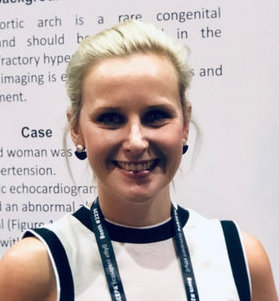
Dr Alexandra Murphy
Women with breast cancer who have a high risk of cardiovascular disease can be identified with a new risk stratification tool to guide the use of preventive therapies, an Australian study has shown.
Dr Alexandra Murphy, a cardiologist at Austin Hospital, Melbourne, reviewed cardiovascular outcomes for 1,173 women with early-stage breast cancer referred to the Olivia Newton John Cancer and Wellness Centre.
During more than four years of follow up, 6.8% of the women experienced a major adverse cardiovascular event (MACE). These women were more likely to be older, with a high burden of cardiovascular risk factors (p≤0.001 for all).
Using data from this cohort, Dr Murphy, who has a special interest in cardio-oncology, developed a prediction tool CRIB (Cardiovascular Risk Index in Breast Cancer) based on factors such as renal impairment, advancing age (≥65 years) obesity (BMI>27), diabetes, hypertension and history of smoking.
The research, presented at the American College of Cardiology’s 2023 Annual Scientific Session, showed that 24% of the breast cancer patients had a high CRIB score (≥3), and this was associated with an 18-fold higher risk of MACE (OR 17.85, 95% CI 6.36 – 50.05; p<0.001). The analysis also showed that mortality was significantly higher in patients who experienced a MACE (HR 2.72, 95%CI 1.75 – 4.23; p<0.001).
“Cardiovascular risk stratification at the time of breast cancer diagnosis using the novel CRIB may help guide surveillance and the use of cardioprotective therapies,” the researchers concluded.
New Zealand data
Meanwhile, a New Zealand study published in The Lancet [link here] has validated local CVD risk prediction equations developed for the general population in a large group of cancer survivors.
The study comprised 14,263 patients who had survived at least two years from a cancer diagnosis including breast, prostate, melanoma, colorectal and other cancers.
It compared the observed 5-year CVD risk with predicted risk in men and women across three risk groups – <5%, 5% to <15%, and ≥15% – as per New Zealand guidelines.
The study found the risk prediction equations developed for the general population slightly underestimated the CVD risk in cancer survivors by <2% for the low-risk groups and overestimated risk by 2-3% for the high-risk group.
“These discrepancies are likely to be trivial from a clinical perspective because most patients would still receive the recommended cardiovascular disease risk management, and the overestimation for the high-risk group would not lead to unnecessary medical treatment because all patients with a 5-year risk of cardiovascular disease of at least 15% are recommended to receive the same preventive management,” the investigators said.
The study noted generalisability might be an issue given CVD risk prediction equations do not include exposure to potentially cardiotoxic cancer treatment or other cancer-related variables such as venous thromboembolism and other clinically significant CVD events that are common in patients with cancer.
“The addition of cancer-specific variables and consideration of competing risks could improve risk prediction in this group of patients.”
An accompanying Comment article in the journal [link here] said risk assessment has become pivotal in the prevention of cardiovascular disease yet research into CVD risk prediction tools among cancer survivors has been limited.
It said the model in the New Zealand study showed moderate discrimination and relatively good performance across the three clinical risk groups of 5-year risk <5%, 5% to <15% and ≥15%.
“This study fills a gap in evidence by showing a reasonably good performance of the model in a population of patients for whom the prediction of cardiovascular disease outcomes had been neglected.”
“Understanding how well an implemented prediction model performs in already heterogeneous populations (eg, to what extent the existing risk prediction models can broadly predict cardiovascular disease risk in survivors of all types of cancer) is of interest to clinicians,” it said.